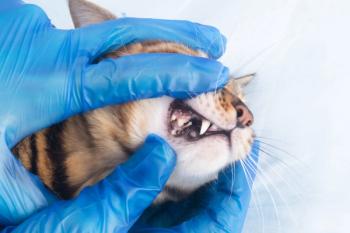
CVC Highlights: A new treatment for feline Tritrichomonas foetus infection
Common infectious causes of diarrhea in kittens include viruses, bacteria, protozoa, helminths, and fungi.
Debra L. Zoran, DVM, MS, PhD, DACVIM, Department of Small Animal Clinical Sciences, College of Veterinary Medicine, Texas A&M University, College Station, TX 77843.
Common infectious causes of diarrhea in kittens include viruses, bacteria, protozoa, helminths, and fungi.
Viral causes of diarrhea that should be considered in kittens include infections with feline panleukopenia virus, rotavirus, astrovirus, and feline enteric coronavirus.
Bacterial diseases that cause diarrhea include salmonellosis, campylobacteriosis, clostridial infections, and occasionally yersiniosis or colibacillosis.
Protozoal and other parasitic causes of diarrhea are commonly found in kittens and may not be easy to diagnose. Specifically, infections with Giardia and Cryptosporidium species are important causes of diarrhea in kittens that can be particularly difficult to identify or treat. Special fecal flotation media, such as zinc sulfate, or ELISA antigen tests to detect Giardia or Cryptosporidium species may be required to identify these organisms. Most of the parasitic causes of diarrhea in kittens (e.g. hookworms, roundworms, coccidian species) are easily found by fecal flotation techniques. However, therapeutic deworming should still be done in kittens that have diarrhea, even if the fecal examination results are negative.
Other infectious causes of diarrhea include fungal diseases such as histoplasmosis; however, histoplasmosis is most likely to occur in adult cats in regions where the disease is prevalent.
Tritrichomonas foetus is a relatively new infectious cause of diarrhea in kittens. Tritrichomonas species can be identified in fecal samples through direct visualization of a wet mount preparation of fresh feces; trichomonads are flagellated organisms that have directed motility (they swim in a line) across the slide. Tritrichomonas species can also be identified through PCR testing* or fecal culture using special media.
Diarrhea caused by this protozoan is difficult to treat because the organism is unresponsive to most antibiotics and long-term antibiotic use may exacerbate the disease. A recent study by researchers at North Carolina State University showed that oral administration of ronidazole (30 to 50 mg/kg b.i.d. for two weeks) to treat Tritrichomonas species infections in kittens may resolve the diarrhea and eradicate the organism.1 Ten orogastrically infected kittens were studied, and no adverse drug events or clinicopathologic abnormalities were observed.1
Ronidazole is a nitroimidazole derivative that is similar to metronidazole and is typically used to treat avian protozoal infections; it is not approved in the United States for use in cats, so its side effects are not well-known. Ronidazole may be available through compounding pharmacies.** Monitor fecal improvement in patients receiving ronidazole. Concurrently providing a highly digestible diet is beneficial in these patients.
REFERENCE
1. Gookin J, Copple C, Papich M, et al. Efficacy of ronidazole in vitro and in vivo for treatment of feline Tritrichomonas foetus infection (abst). J Vet Intern Med 2005;19:436.
*Many laboratories offer PCR testing for Tritrichomonas species. It may be best to send fecal samples to laboratories that perform PCR testing for Tritrichomonas species in cattle.Or send them to Dr. Jody Gookin, Department of Molecular Biomedical Sciences, School of Veterinary Medicine, North Carolina State University;
**Westlab Pharmacy, 4410 W. Newberry Road, Suite A5, Gainesville, FL 32607; (352) 373-8111.
Attendees selected this highlight from CVC lectures. The original paper was published in the proceedings of the 2005 Central Veterinary Conference.
Newsletter
From exam room tips to practice management insights, get trusted veterinary news delivered straight to your inbox—subscribe to dvm360.






